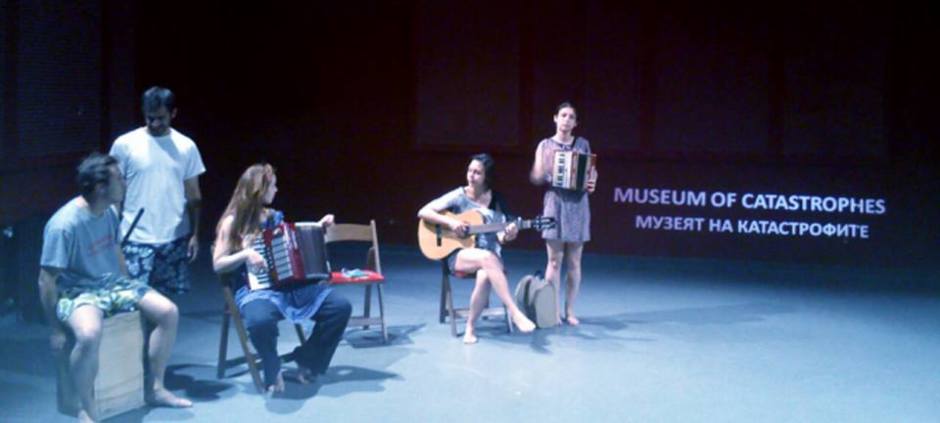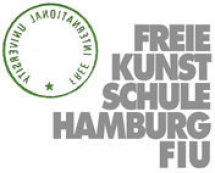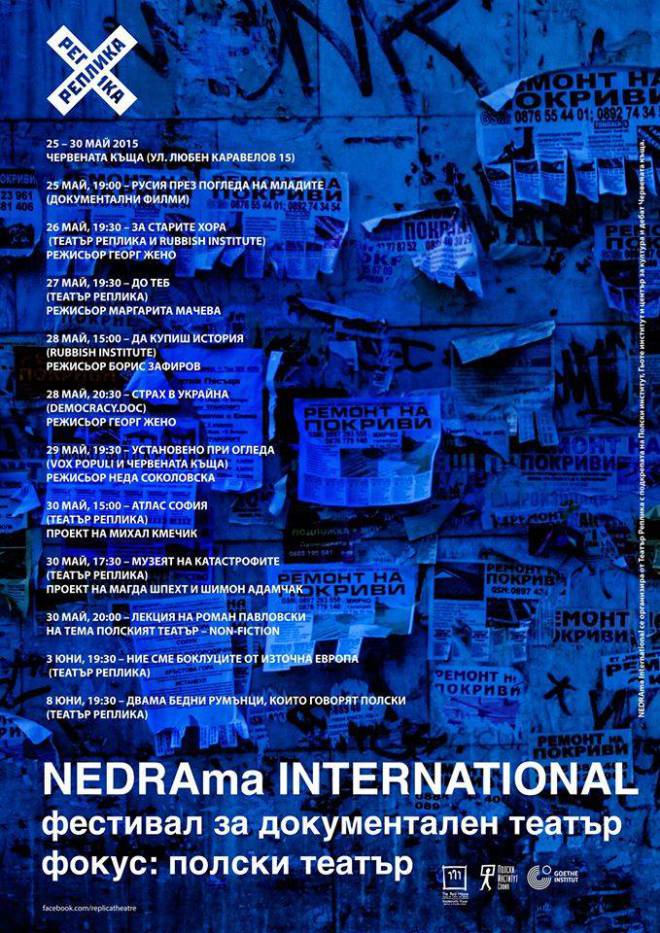The Museum of Catastrophes and Atlas Sofia at NEDRAma 2015.
By Georg Genoux
"Theatre Replika’s NEDRAma laboratory came to a close three days ago. To my mind it was the most exciting NEDRAma laboratory so far. I put the actors of Theatre Replika in touch with a group of young Polish directors and playwrights that I had met at previous workshops in Krakow and in Sopot; Michał Kmiecik, Magda Szpecht, and Szymon Adamczak. Michal was a participant in NEDRAma 2014 where he began developing his project Atlas Sofia. I saw Magda and Szymon’s project The Dolphin who Loved Me at the Sopot NON FICTION festival led by Roma Pawlowski in 2014.
On the final day of the NEDRAma festival I saw two projects that were the result of 12 days of intensive collaboration between the actors of Theatre Replika and our Polish guests. I was excited to see how this Polish-Bulgarian experiment would turn out. Magda and Szymon’s Museum of Catastrophe seemed to me, at first, a real catastrophe.
The performance began with “body work,” exercises and improvisations that resembled contemporary dance more than what I imagine to be documentary theatre. I felt confused. “What are they doing at a laboratory for documentary theatre?”
After this lengthy process, the actors began to share stories of their own personal catastrophes and little by little I understood that this extensive “body work” at the beginning was an absolutely integral element to the performance. It was necessary to create an environment of trust, a space where people could share the kind of intimate stories that our actors then shared. They didnt copy the reality, they created a new reality here and now. They created a space in which the actors could share the most private and intimate “documents of their own catastrophes.” They became not only actors, but ambassadors of their own biographies. Their “museum” featured an exhibition of these 5 actors’ pain. Some of the texts were so cruel and private that they wouldn’t allow me to post about them on Facebook.
But these cruel confessions of their own catastrophes placed the audience in a very uncomfortable situation. It was physically unpleasant to hear these narratives. Again, I felt confused: “What for?” Then suddenly the actors were transformed into an orchestra with their own instruments. They started to improvise and to joke around. They began telling jokes about their catastrophes. Irinia Andreeva said, “I will find a solution through a sense of humor. My man doesn’t know that I’m so worried but, if he finds out he will accept with humor.”
This began an unusual process of transforming the actors’ catastrophes through music and jokes into a productive live experience. And this process of transformation was so cute and funny, it was presented with such happiness and joy, that I started to imagine how I could be happy about all my catastrophes. I imagined that I too could transform them just as the actors of Replika just had along with Magda and Szymon in that space.
The second piece was Michał Kmiecik’s Atlas Sofia. Last summer Michał worked on a piece in which actors transformed into monuments live onstage thereby giving them new meaning in contexts. They came alive instead of maintaining their previous invisibility. As Michał and the actors transformed these sculptures, I had the opportunity to transform my own thought process and my relationship to my country’s past, a place where so many tragedies have not been worked through and where such a process could help us deal with the trauma of our history.
This was a very direct presentation of “Memory Drama.” It was also a process that broke free from the heaviness of the past because it portrayed the monuments with humor and irony. At this year’s NEDRAma, he developed a path towards radical freedom. The audience became included in the process of transformation. We were asked to organize ourselves in relation to the live sculptures.
One of the ways this was accomplished was when an audience member was handed a piece of paper with instructions. In this case you could say “no” and refuse to do it. Never before could I have imagined that would walk on all fours enthusiastically roaring like a lion. I felt very good after that.
Michal created a space of freedom that stood in contrast to the heaviness of historical monuments. For me the culminating moment was when one of the actors suddenly said, “All these monuments in out town are never smiling, only one: the monument of Radoy Ralin.”
I hope that this Bulgarian-Polish collaboration will continue to develop these wonderful projects. In the case of Michal’s work, I would like it if he continued to develop both his 2014 and 2015 versions of Atlas Sofia because I think they would work well together.
I hope these artists will continue to collaborate, not only on the two productions shared onstage, but in the style of work they developed over the course of these 12 days.
One of the core ideas of Theatre Replika is an investment in sensitive intercommunication and mutual support. The actors of Theatre Replika have often said that the process of communication is a higher priority than any onstage success. To them, building trust and love is the highest form of art. They call it support. I call it social sculpture. This process was apparent in the collaborative work between these Polish and Bulgarian theatre artists.
The day after the performance I spoke with Boryana Peneya, one of the Replika actors and she told me how sad she is to see such wonderful people leaving. So, the task now is to bring them back)))
This was the last NEDRAma I will participate in before I move from Sofia to Kyiv to start a new theatre project. We founded NEDRAma in 2013 as a program for documentary, interdisciplinary theatre and as a platform for the development of young theatre artists. Many of our projects grew into full productions after being developed in our laboratories: "Next to you" by Margarita Macheva, "To buy a story" by Boris Zafirov, "We are the Rubbish of Eastern Europe" by the actors collective of Theatre Replika, "Do you listen to the Driver" by Josephine de Weck, "Natasha's Dream" by Ovanes Torosyan, "About the Old people" and as a result of a workshop by Neda Sokolovska at NEDRAma 2013 the participation of actors from Theatre Replika in the fantastic documentary project "Protest.mp3" by VOX POPUPLI.
This year NEDRAma received no support from the government and therefore, almost did not happen. But, Boryana Peneva, Irina Andreeva, Vasilka Bumborova, Blagoi Boichev and Milko Yovchev did not give up. They organized the festival themselves with barely any financial support. Once again, the state system proved meaningless and the artists of Theatre Replika created an event worthy of celebration for themselves and their guests."




